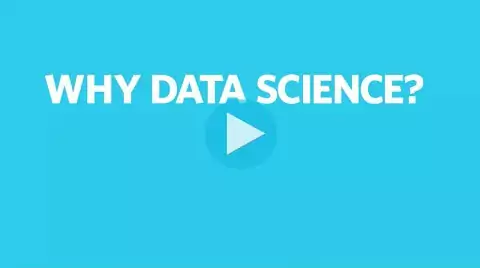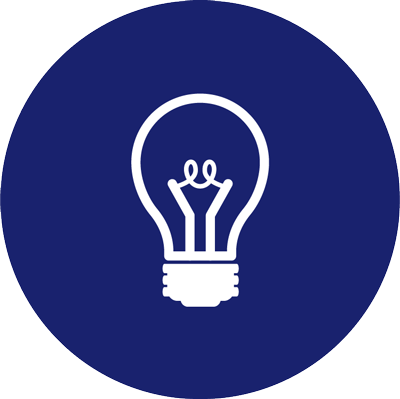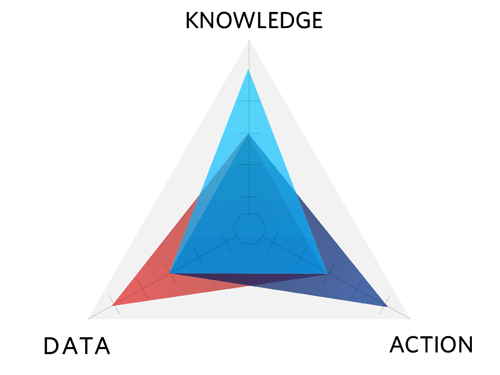
Why Data Science?

There’s no question that data is affecting the way we work, live, and think about the world. Everything we do generates data and every new technology used to capture this data brings with it even more opportunities to extract knowledge, to learn, to grow, and to create change.
However, most organizations today, across every sector, lack the staff with the necessary skills to capitalize on these growing opportunities.
That’s why data science continues to be one of the most in-demand career paths for those with the curiosity, creativity, and drive to pursue it.
How do you know which Data career path is right for you?
If we follow the journey of data from its initial stage of collection to providing decision makers with actionable insights, we train for a broad spectrum of data-related careers. This spectrum, also called the data science value chain, can be broken into three distinct categories:
Data.

Knowledge.

Action.

The unique interests and natural tendencies of those working in one area of the value chain versus another will differ slightly, but all data professionals are positioned along the same data science continuum and support one another through the transition from data to knowledge to action. Graduates of the MDS program can expect to work alongside experts from the Data portion of the value chain, in big data* for example, as well as those from the Action portion of the value chain, in business analytics** for instance.

There is considerable overlap in the skills required for careers across the value chain. The following outlines the areas of focus for programs within each section as well as the types of careers they would prepare you for.
DATA
Programs focus on data collection, storage, and manipulation (predominantly Computer Science/programming courses). Roles focused on big data normally require extensive computer science background and are focused more on software development. Example employment positions include:
- Data Engineer
- Data Architect
- Systems Analyst
- Database developer
KNOWLEDGE
Programs like UBC’s Master of Data Science focus on working with data in all its forms, asking relevant questions, analyzing and uncovering data stories, and communicating these stories to decision makers. Most MDS graduates will work in this area. While again, there is some career overlap, example employment positions include:
- Information Technology Manager
- Data Developer
- Data Scientist
- Data Visualization Expert
- Data Analyst
- Machine Learning Engineer
- Research Engineer
ACTION
Programs focus on utilizing extracted data insights to take action (predominantly business courses). These programs likely won’t focus on coding or wrangling data, but rather analyzing data and teaching graduates how to make data-driven business decisions. Example employment positions include:
- Business Analyst
- Business Intelligence Analyst
- Business Systems Developer
COMPUTATIONAL LINGUISTICS
Those who specialize in computational linguistics will have the opportunity to solve difficult linguistic problems using computers with an eye towards taking roles in the creation of the next generation of language-aware software. The majority of potential careers in computational linguistics pertain to the Knowledge portion of the value chain. Some examples include:
- Corpus Linguist
- Computational Linguists
- Machine Learning Engineering
- Data Scientist
- Natural Language Processing Engineering
- Research Engineer
- Machine Learning Researcher
*SFU’s Professional Master’s Program in Big Data develops data architects who apply a deep knowledge of computer science to create new tools that find value in the vast amounts of information generated today. The program targets students whose undergraduate degrees are in computer science, or in quantitative fields, such as engineering or physics.
**UBC's Sauder School of Business Master of Business Analytics gives candidates with quantitative backgrounds sought-after analytical skills within a broader business context. Graduates will be able to apply advanced analytical tools and methods to address management challenges in today’s business world.
Data in Action
Determining Restaurant Sales Performance Drivers Through Feature Selection
Sitewise Analytics, a Software-as-a-Service company, specializing in developing site forecast models, sales impact assessments, and actionable market strategy plans for leading restaurant, retail, real estate, and healthcare chains, partnered with Master of Data Science (MDS) Vancouver students to understand which specific factors drive success (and failure) for certain restaurant brands.